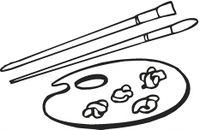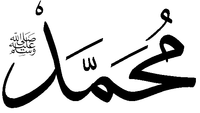Difference between revisions of "Category:Muhammad--art (subject)"
| Line 12: | Line 12: | ||
Shia Islam is more tolerant; depictions of Muhammad are somehow permitted, provided that they are done "with respect". In Persian art, portraits of Muhammed can be found in manuscripts until the end of 16th century. After that period, the face of Muhammed is generally erased or covered by a veil and surrounded by a halo. Depictions of Muhammad are not uncommon among Shia Muslims even today. | Shia Islam is more tolerant; depictions of Muhammad are somehow permitted, provided that they are done "with respect". In Persian art, portraits of Muhammed can be found in manuscripts until the end of 16th century. After that period, the face of Muhammed is generally erased or covered by a veil and surrounded by a halo. Depictions of Muhammad are not uncommon among Shia Muslims even today. | ||
Western (non-Muslim) representations of Muhammed are rare. Some are polemical and derogatory, as in the | Western (non-Muslim) representations of Muhammed are rare. Some are polemical and derogatory, as in the fresco in the Church of S. Petronio in Bologna, or in book illustrations of the Divine Comedy by Salvador Dalí, Auguste Rodin, William Blake, and Gustave Doré. In other cases, they are well-intentioned attempts by the artist to honor Muhammad for his contribution to world civilization, as in the frieze at the United States Supreme Court building in Washington, D.C. (1935), or in engravings in printed biographies of Muhammad. | ||
==External links== | ==External links== | ||
* [https://en.wikipedia.org/wiki/Depictions_of_Muhammad Wiki.en (Depictions of Muhammad)] | * [https://en.wikipedia.org/wiki/Depictions_of_Muhammad Wiki.en (Depictions of Muhammad)] | ||
Revision as of 03:22, 9 June 2017


Overview
The Qur'an does not explicitly forbid images of Muhammad, but Islamic tradition warns Muslims against creating visual depictions of figures.
Sunni Islam rigorously rejects any depictions of Muhammad. The most common visual representation of the Prophet is by a calligraphic representation of his name in Arabic, a sort of monogram in roughly circular form, often given a decorated frame. In some Muslim countries any representation of the Prophet is banned by law.
Shia Islam is more tolerant; depictions of Muhammad are somehow permitted, provided that they are done "with respect". In Persian art, portraits of Muhammed can be found in manuscripts until the end of 16th century. After that period, the face of Muhammed is generally erased or covered by a veil and surrounded by a halo. Depictions of Muhammad are not uncommon among Shia Muslims even today.
Western (non-Muslim) representations of Muhammed are rare. Some are polemical and derogatory, as in the fresco in the Church of S. Petronio in Bologna, or in book illustrations of the Divine Comedy by Salvador Dalí, Auguste Rodin, William Blake, and Gustave Doré. In other cases, they are well-intentioned attempts by the artist to honor Muhammad for his contribution to world civilization, as in the frieze at the United States Supreme Court building in Washington, D.C. (1935), or in engravings in printed biographies of Muhammad.
External links
This category currently contains no pages or media.